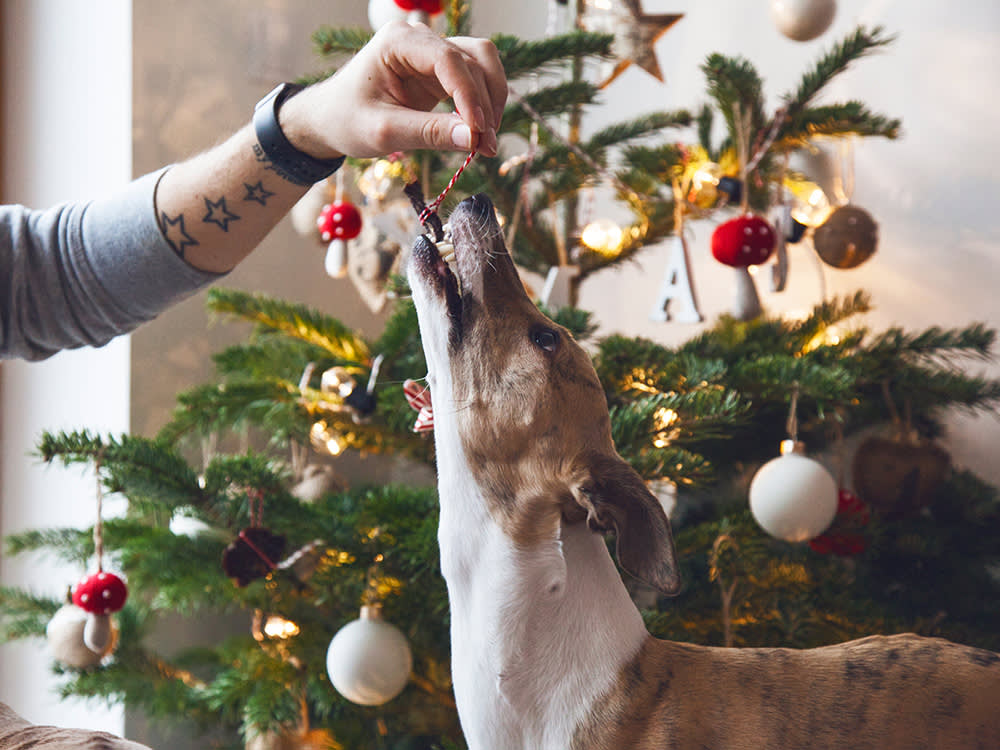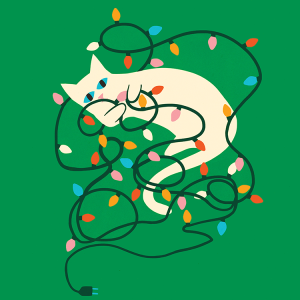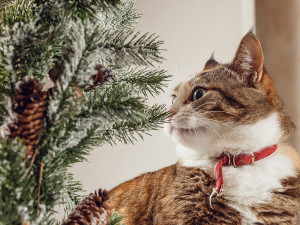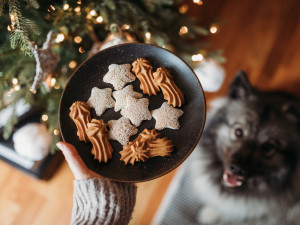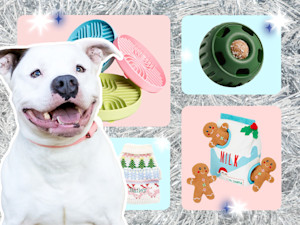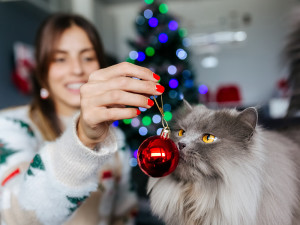8 Pet Hazards That May Be in Your Home This Holiday Season
Some plants are not so merry.
It’s the holiday season, so your house may be full of things your pets aren't usually in contact with for most of the year, from ornaments to Christmas trees to candles to chocolate Santas. All these new additions can be exciting (so much to explore!) for cats and dogs, but some can be just as hazardous — especially if a curious pet is left unattended. Here’s a checklist of the common holiday hazards for animals, so you can ensure your pet can safely enjoy the holiday spirit and stay out of the emergency room.
1. Holiday lights
They might look cute, but decorative lights on the tree can pose a serious electrocution hazard when chewed by dogs. Take appropriate precautions to ensure lights are hung out of reach, and the cord is adequately protected. Use grounded three-prong extension cords and strictly follow the manufacturer’s guidelines for light usage.
Signs of electric shock range from a dazed and confused behavior to difficulty breathing, burn injuries in the mouth, seizures, and potentially sudden death. If you suspect electrocution, you should take your pet to a veterinarian immediately.
2. Tinsel and ribbons
A not-so-fun fact: Tinsel and ribbon can potentially obstruct the intestines when ingested. In medical terms, we refer to these items as “linear foreign bodies.” They have significant potential to get bound up within the intestinal tract causing a blockage and, in some cases, cutting through the intestines.
How much do you spend on your pet per year?
These linear foreign bodies often get “hung up” in the intestines, causing deadly “bunching,” and can only be removed by surgical means. If you notice a bit of ribbon, tinsel, or string, whether from the mouth or the other end (err, out of their rump), it is important to remember never cut the ribbon or attempt to remove it yourself. Seek veterinary care immediately.
Vomiting, diarrhea, loss of appetite, and depression are the most common abnormalities seen when an intestinal obstruction develops, and early surgical care is essential. Never leave pets unattended around string, tinsel, and ribbon — it’s not worth the risk.
3. Christmas ornaments
They may look like decorations to you, but those hanging ornaments may look like a snack to your pet. Ornaments may be ingested and have the potential to cause an obstruction leading to the need for surgery. Plus, ornaments made of glass can fall and break, leading to cuts and other injuries. Adequately secure ornaments and place them above the reach of wandering paws and curious noses.
4. Christmas trees
Tree-stand water contains preservatives and sap that may cause vomiting and diarrhea. In addition to the water, pine needles can irritate the esophagus and may cause vomiting, diarrhea, lethargy, trembling, and weakness. An artificial tree may be a safer option, or you can try adding deterrents under the tree or a barrier around the base. Make sure your pet is provided with playtime and stimulation throughout the day to deter them from exploring.
5. Toxic holiday plants
Festive plants are often displayed during the holidays, and precautions should be taken to avoid ingestion of any plant. Even “non-toxic” plant material, such as pine needles, may cause stomach upset. Common holiday plants to take particular note of include:
Lilies are extremely toxic to cats.
Ingestion of any part of the lily plant, even in small amounts, can cause life-threatening toxicity in cats. Early signs include lethargy and vomiting. Without prompt treatment, most cats will become extremely ill and develop kidney failure within 36 to 48 hours of ingestion.
Amaryllis is toxic to both dogs and cats.
Also known as belladonna-lily, this plant often causes vomiting, diarrhea, and belly pain in cats and dogs. It can also cause more serious problems, including low blood pressure and liver damage.
Poinsettia plants are considered to be mildly toxic to pets.
Poinsettias often only cause mild stomach upset and/or skin irritation in pets. Treatment is recommended only if any clinical signs develop. Research estimates that the average animal would have to ingest 500 to 600 poinsettia leaves to surpass toxic levels. The most common symptom is irritation to the mouth and stomach, which sometimes causes vomiting.
Mistletoe contains a variety of potential toxins.
Mistletoe and holly species can cause serious poisonings, though this is less common. Clinical signs of mistletoe poisoning in dogs are usually limited to salivation, vomiting, and diarrhea. Other symptoms of mistletoe ingestion include gastrointestinal disorders, cardiovascular collapse, dyspnea, bradycardia, erratic behavior, vomiting, diarrhea, and low blood pressure.
6. Potpourri
Potpourri is often used around the house to put us in the holiday mood. The plant material and some additives are very irritating to the skin, mouth, and intestinal tract. If skin exposure is suspected, then bathing with a mild soap is recommended, and medical care may be needed to treat irritation and pain that follow exposure. Ingestion often results in signs that may include drooling, loss of appetite, vomiting, and in some cases, disorientation.
7. Hazardous treats
Treats are a common source of holiday emergencies. While it can be hard to resist your pleading pet’s eyes, it is important to recognize the dangers of particular foods and treats.
Bones expose your pets to many unnecessary risks, including the potential for choking or developing an obstruction in their intestinal tract. Cooked bones, when chewed, can fragment into tiny slivers that can cause severe irritation to the intestinal tract as they pass. Rawhides and bully sticks have the potential to cause choking and intestinal obstruction.
8. Toxic foods
“People foods” that we take for granted as being safe for us are not always safe for pets, in fact, some foods are downright toxic to dogs and cats.
Raisins and grapes have been implicated in causing kidney failure in dogs.
Onion ingestion can cause blood cell damage in both dogs and cats.
Chocolate contains caffeine and a caffeine-like substance (theobromine) that is toxic to dogs and cats.
Macadamia nuts cause dogs to show a variety of strange neurological signs that can include weakness, apparent pain, disorientation, and tremors.
Fatty foods such as meat trimmings are common culprits for causing stomach upset, vomiting, diarrhea and pancreatitis.
